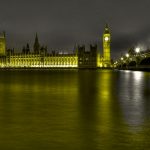UK porn sites may have to implement over 18 age verification

In a push for a more family-friendly Internet, the UK government is considering plans that could mean porn and adult websites will soon have to verify that visitors are over 18 years of age.
The legislation is being drawn up by the Department of Culture, Media and Sport (DCMS), and would initially only affect UK-based websites. Similar to the verification tools already in use by gambling websites, the plans would also affect the owners of domains that sell guns or any other kind of adult content.
Why the government needs access to your data

We are in Brussels at the 27th annual Information Security Solutions Europe Conference (ISSE), one of Europe's largest gatherings of cyber security experts.
Troels Oerting of the Danish police gave a fascinating opening keynote defending the right of the police to use surveillance over the Internet. It certainly ruffled some feathers in Brussels, but here are some of the highlights so you can make up your own mind.
Twitter walks the walk -- sues the United States Government

I am a very patriotic American; my love for my country is unending and unwavering. However, nothing is perfect and no entity is without mistake, including the United States Government. Sure, there are times when being transparent is not possible, such as telegraphing military movements -- soldiers should never be put at risk. With that said, American citizens arguably deserve full transparency on other things, such as government requests that can impact their privacy.
Twitter is trying to be as open and transparent as possible; however, the US government is blocking that desire. Previously, the company talked the talk, saying "we are weighing our legal options to provide more transparency to our users". Today, the social network walks the walk and sues the government, fighting for the right to be open with its users -- free from government intervention.
Occupy Hong Kong protesters are locked in a technology arms race with the Chinese government

Thousands of protesters have flooded into the heart of central Hong Kong over recent days to demonstrate against the Beijing government's plans to phase out the semi-autonomous province's democratic elections by 2017. The campaign seeks to blockade Hong Kong's financial center, and represents the first major challenge to the rule of the new Chinese President, Xi Jinping.
For anyone confused by the protests, here's a bit of background: when the UK handed the territory of Hong Kong back to China in 1997, the Chinese government agreed to a policy of "one country, two systems" that allowed the city a high degree of control over its own affairs and kept in place civil liberties unseen on the mainland. It also promised the city's leader would eventually be chosen through "universal suffrage". That appears to not have been entirely true, and it's got thousands of people taking to the streets.
What a shocker! FBI head complains about Apple and Google's encryption practices

Apple and Google do not want the US Government to be able to access your private data, even when search warrants are involved. It's a bold stand they're taking, which has been applauded by privacy advocates and, quite probably, criminals as well. But, guess what? That does not sit well with the authorities. FBI Director James Comey is troubled by the idea that the all-mighty agency that he runs can be stopped dead in its tracks when trying to see your intimate photos, videos and whatnot. Imagine that.
Here's what the fuss is all about. If encryption is turned on, the encryption key, that is needed in order to access the data that is stored on an Android or iOS 8 device, is in the user's control, instead of Google's or Apple's. As such, this allows the companies to be unable to comply with search warrants. It's clever: you can't give what you don't have.
Political infighting may stifle your Internet speed

New analysis shows that the increase in the average Internet speed over the past five years is generally much smaller in politically divided states than in states controlled by a single party.
Democrats and Republicans both have stats to point to when touting their policies about high-speed Internet, but just because America’s two biggest political parties have had individual success with their high-speed Internet policies, doesn’t mean they’ve learned how to work together.
GCHQ accused of scanning entire nations for hacking vulnerabilities

The UK's Government Communications Headquarters (GCHQ) spy agency has been exposed scanning entire countries for server weaknesses that allow it to exploit vulnerable ports. According to reports, it does this using a tool called Hacienda, which is Spanish for estate.
The accusations came out in German newspaper Heise. "In 2009, the British spy agency GCHQ made port scans a 'standard tool' to be applied against entire nations," Heise reports. "Twenty-seven countries are listed as targets of the Hacienda".
Google vs the British government and the fight to be forgotten

The current uproar around various facets of data collection and use -- be it "the right to be forgotten" or the emergency data legislation being considered by Prime Minister David Cameron in the UK -- is divisive to say the least.
If your only source of information is the mainstream press, you’d be forgiven for thinking it comes down to two immiscible sides of an argument. On one side there’s the posited right for governments and people to access whatever information they need, whenever they need it. On the other side are those who believe that they have an absolute right to privacy, whatever the threats governments say we’re facing.
China bans Kaspersky and Symantec antivirus

China has come down hard on US-based security company Symantec and its Russian counterpart Kaspersky, removing it from the list of approved antivirus providers in Chinese government computer systems.
The news comes amid a move from the Beijing government to limit Chinese dependency on foreign technology firms.
Russia offers a $112,000 bounty to anyone who can crack Tor

Russia's government has issued a 4 million rubles (about $112,000) bounty to anyone who cracks the Tor anonymity network's encryption protocols.
Tor, which began as a secret project from the US Naval Research Laboratory, works by piling up layers of encryption over data, nested like the layers of an onion, which gave the network its original name, The Onion Router (TOR).
UK government turns its back on Microsoft Office

The UK government has formally announced that all government departments are to use the open document format [ODF] for documents immediately in a move that is part of the government’s total savings target of £1.2 billion.
A press release stated that the ODF standard is being used for sharing and collaborating on government documents whereas PDF/A or HTML is becoming the standard for viewing government documents.
Miniature Hero, Underpass, Badger, Rolling Thunder and Angry Pirate -- just some of GCHQ's secret spy programs

The hacking and spying techniques of the UK's Government Communications headquarters (GCHQ) have been exposed in the latest leak by Edward Snowden. The wide-ranging techniques include invasive methods for online surveillance, as well as some of the very techniques that the US and UK have harshly prosecuted young online activists for employing, including distributed denial of service (DDoS) attacks and "call bombing".
The document is set out in a massive Wikipedia-style archive used by GCHQ to internally discuss its surveillance and online deception activities.
Ubuntu saves Munich millions -- should all governments switch to Linux?

Trust in government is not exactly at an all-time high. Sure, there are oppressive governments such as Iran and China that filter and block web content, but even the USA has a spotty record. With all the news of PRISM and other spying programs, it is hard to tell which way is up anymore.
One way to solve this dilemma is through transparency and honesty. Unfortunately, as long as governments use closed-source software, it is hard to audit and trust the actions. Today, Canonical announces that not only has Munich taken an open approach to computing with Ubuntu, but the city is saving millions of euros too. Using open-source software and saving money? Hell, maybe all governments should make the switch to Linux.
GCHQ faces legal action from ISPs over alleged spying and network attacks

Seven internet service providers (ISPs) have filed a legal complaint against the UK's intelligence agency GCHQ.
Since a series of high-profile allegations made last year by US whistleblower Edward Snowden, government agencies have had to face claims of spying and intrusion but this is the first time GCHQ has faced legal action.
Bitcoin quietly goes legit

The US Marshals Service doesn’t normally make economic policy but this week they apparently did so by auctioning 30,000 Bitcoins, a crypto currency I have written about before. This auction effectively legitimizes Bitcoins as part of the world economy. Am I the only one to notice this?
My first column on this subject was a cautionary tale pointing out the two great areas of vulnerability for Bitcoin: 1) the US Government might declare Bitcoins illegal, and; 2) someone might gain control of a majority of Bitcoins in which case their value could be manipulated. While number two is still theoretically possible it becomes less likely every day. And number one seems to have been put to rest by the U.S. Marshals.
Recent Headlines
Most Commented Stories
BetaNews, your source for breaking tech news, reviews, and in-depth reporting since 1998.
© 1998-2025 BetaNews, Inc. All Rights Reserved. About Us - Privacy Policy - Cookie Policy - Sitemap.